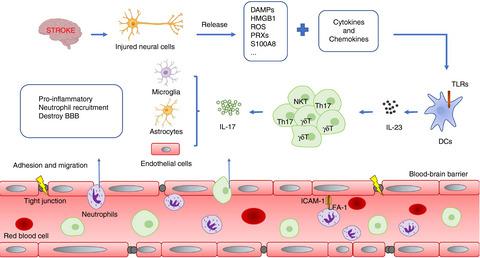当前位置:
X-MOL 学术
›
Immunology
›
论文详情
Our official English website, www.x-mol.net, welcomes your feedback! (Note: you will need to create a separate account there.)
Interleukin-17 and ischemic stroke.
Immunology ( IF 6.4 ) Pub Date : 2020-09-16 , DOI: 10.1111/imm.13265 Qiaohui Zhang 1 , Yan Liao 1 , Zhenquan Liu 2 , Yajie Dai 1 , Yunxin Li 1 , Yue Li 2 , Yibo Tang 1
Immunology ( IF 6.4 ) Pub Date : 2020-09-16 , DOI: 10.1111/imm.13265 Qiaohui Zhang 1 , Yan Liao 1 , Zhenquan Liu 2 , Yajie Dai 1 , Yunxin Li 1 , Yue Li 2 , Yibo Tang 1
Affiliation

|
Interleukin‐17 (IL‐17) is a cytokine family that includes 6 members, IL‐17A through IL‐17F, most of them are reported to have pro‐inflammatory role. Through binding to their receptors (IL‐17Rs), IL‐17 activates the intracellular signalling pathways to play an important role in autoimmune diseases, including rheumatoid arthritis (RA) and multiple sclerosis (MS). Ischaemic stroke is a complex pathophysiological process mainly caused by regional cerebral ischaemia. Inflammatory factors contribute to the physiological process of stroke that leads to poor prognosis. IL‐17 plays a crucial role in promoting inflammatory response and inducing secondary injury in post‐stroke. Though immune cells and inflammatory factors have been reported to be involved in the damage of stroke, the functions of IL‐17 in this process need to be elucidated. This review focuses on the pathological modulation and the mechanism of IL‐17 family in ischaemic stroke and seeking to provide new insights for future therapies.
中文翻译:

白细胞介素 17 和缺血性中风。
白细胞介素-17(IL-17)是一个细胞因子家族,包括6个成员,IL-17A至IL-17F,据报道其中大多数具有促炎作用。通过与其受体 (IL-17Rs) 结合,IL-17 激活细胞内信号通路,在类风湿性关节炎 (RA) 和多发性硬化症 (MS) 等自身免疫性疾病中发挥重要作用。缺血性脑卒中是一个复杂的病理生理过程,主要由局部脑缺血引起。炎症因素有助于中风的生理过程,导致预后不良。IL-17 在促进炎症反应和诱导卒中后继发性损伤中起关键作用。尽管有报道免疫细胞和炎症因子参与了脑卒中的损伤,但 IL-17 在这一过程中的作用仍有待阐明。
更新日期:2020-09-16
中文翻译:

白细胞介素 17 和缺血性中风。
白细胞介素-17(IL-17)是一个细胞因子家族,包括6个成员,IL-17A至IL-17F,据报道其中大多数具有促炎作用。通过与其受体 (IL-17Rs) 结合,IL-17 激活细胞内信号通路,在类风湿性关节炎 (RA) 和多发性硬化症 (MS) 等自身免疫性疾病中发挥重要作用。缺血性脑卒中是一个复杂的病理生理过程,主要由局部脑缺血引起。炎症因素有助于中风的生理过程,导致预后不良。IL-17 在促进炎症反应和诱导卒中后继发性损伤中起关键作用。尽管有报道免疫细胞和炎症因子参与了脑卒中的损伤,但 IL-17 在这一过程中的作用仍有待阐明。



























 京公网安备 11010802027423号
京公网安备 11010802027423号